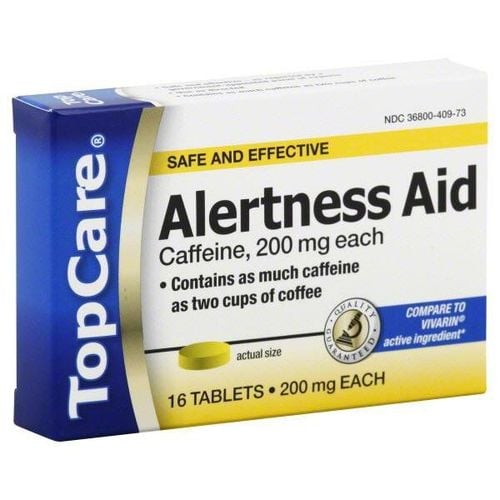This is an automatically translated article.
What is dvorah and what does dvorah do? Dvorah is used to relieve moderate to severe pain. Dvorah is a combination of an opioid pain reliever (dihydrocodeine), a non-opioid analgesic and antipyretic (acetaminophen), and caffeine (increased pain relief, especially for certain types of headaches).
1. How to use Dvorah
Read the Medication Guide provided by your pharmacist before you start taking acetaminophen/caffeine/dihydrocodeine and each time you get a refill. If you have any questions, ask your doctor or pharmacist for answers.
Take medication as directed by your doctor, usually every 4 hours when pain relief is needed. You can take the medicine during or before / after a meal. If you have nausea, taking Dvorah with food may help. Ask your doctor or pharmacist about other effective ways to relieve nausea, such as lying still for 1-2 hours, limiting head movement.
Dosage of Dvorah is based on each person's medical condition and response to treatment. Do not increase the dose on your own or use it more often or for longer than directed to avoid increasing the risk of side effects. You should also not stop taking your medicine without consulting your doctor or pharmacist.
Pain relievers are generally most effective if used as soon as the first signs of pain appear. If you wait until the pain gets worse, the medicine may not work as well.
Stopping Dvorah suddenly can cause side effects, especially for people who have used it for a long time or in high doses. To prevent this, your doctor may reduce your dose slowly before stopping it completely. Tell your doctor or pharmacist if you stop taking any of the following symptoms:
Restlessness Mental/mood changes (including anxiety, trouble sleeping, suicidal thoughts) Tears Runny nose Nausea Diarrhea Sweating Muscle pain Sudden changes in behavior.
Medicines used for a long time may no longer work. Tell your doctor if the medicine stops working. Also, don't forget to tell your doctor if your pain doesn't get better or gets worse despite taking the medicine as directed.
Although beneficial for many people, Dvorah can sometimes be addictive. This risk is increased if you use stimulants, such as abusing or addicted to drugs/alcohol. Taking medication exactly as prescribed is one way to reduce the risk of addiction. Ask your doctor or pharmacist if you need more details.

Dvorah được sử dụng bằng đường uống quá miệng
2. Side effects when taking Dvorah
Some possible side effects include:
Nausea Vomiting Constipation Dizziness Dizziness Drowsiness Headache Frequent urination Difficulty sleeping. If any of these side effects persist or get worse, tell your doctor or pharmacist right away.
To prevent constipation, you should eat plenty of fiber, drink enough water and exercise. In some cases, laxatives may also be needed. Ask your pharmacist to choose the right laxative for you.
To reduce the risk of dizziness and lightheadedness, get up slowly while sitting or lying down.
It should be noted that when you were prescribed Dvorah , your doctor judged that the benefit of treatment outweighed the risk of side effects. There are still many cases of using this drug safely, without serious side effects.
Also, tell your doctor right away if you experience any of the following serious side effects:
Sleep apnea Mental/mood changes (such as irritability, nervousness, anxiety). anxiety, hallucinations) Fast/irregular heartbeat Stomach/abdominal pain Difficulty urinating Vision changes Tremor Signs that the adrenal glands are not working properly (such as loss of appetite, unusual tiredness, weight loss) .
Seek medical help right away if you experience very serious side effects, including fainting and seizures.
Dihydrocodeine is converted into a strong opioid medicine (dihydromorphine) in your body. In some people, this change happens more quickly than usual, increasing the risk of very serious side effects. Get medical help right away if you notice any of the symptoms below:
Slow/shallow breathing Severe drowsiness/difficulty waking Confusion. In fact, it is very unlikely that a serious allergic reaction to Dvorah will occur. However, get medical help right away if you experience symptoms of a serious allergic reaction, including:
Rash Itching/swelling (especially of the face/tongue/throat) Severe dizziness Difficulty breathing. Also, if you experience side effects other than those listed above, contact your doctor or pharmacist for help.

Dvorah có thể gây tác dụng phụ nguy hiểm như khó thở
3. Caution when using Dvorah
Before taking this medicine, tell your doctor or pharmacist if you are allergic to dihydrocodeine, acetaminophen or caffeine, or any other allergic condition. This product may contain inactive (inactivated) ingredients, which may cause allergic reactions or other problems. Drug users should ask the pharmacist for more details.
You also need to tell your doctor or pharmacist your medical history before taking Dvorah, especially of:
Brain disorders (such as head injury, tumors, blurred vision) Breathing problems (such as asthma, sleep apnea, chronic obstructive pulmonary disease-COPD) Gallbladder disease Heart problems (such as irregular heartbeat, recent onset of heart attack) Kidney disease Liver disease Liver disorder mental/mood (such as confusion, depression, suicidal ideation) Personal or family history of substance use (such as drug/alcohol abuse or addiction) Obesity stomach/intestinal problems (such as obstruction, constipation, infectious diarrhea, ileal paralysis) Disease of the pancreas (pancreatitis) Difficulty urinating (eg, due to an enlarged prostate gland). The medicine may make you dizzy, drowsy, or blur your vision. Using alcohol or marijuana can make you more dizzy or drowsy. Therefore, do not drive, operate machinery, or do anything that requires alertness and clear vision until you are safe. Talk to your prescriber if you are using marijuana or alcohol.
Before having surgery or certain medical procedures (such as checking your heart rate or restoring a normal heart rate to someone with an abnormally fast heart rate), tell your doctor or dentist about all products you use (including prescription drugs, over-the-counter medicines, and herbal products).
Older adults may be more sensitive to the side effects of Dvorah, especially symptoms of confusion, dizziness, drowsiness, trouble sleeping, and slow/shallow breathing.
According to some reports, the drug can harm an unborn baby. Therefore, during pregnancy, Dvorah should only be used when absolutely necessary and has been carefully weighed by a doctor about the risks compared to the benefits.
This medicine passes into breast milk and may cause unwanted effects in an infant, such as unusual sleepiness, trouble feeding, trouble breathing, or a limp. Therefore, women being treated with Dvorah are not recommended to breast-feed. Consult your doctor for more details.
4. Dvorah drug interactions with other drugs
Drug interactions can change the way Dvorah works or increase your risk of serious side effects. Make a list of all the medications you're taking (including prescription/over-the-counter and herbal medicines), then share them with known doctors and pharmacists. Do not start, stop, or change the dosage of any medication without your doctor's approval. Products that may interact with Dvorah include:Certain pain medications (opioid blends such as: pentazocine, nalbuphine, butorphanol) Naltrexone. If taking this medicine with other products also causes drowsiness or breathing problems, the risk of serious side effects may be increased, such as:
Slow/shallow breathing Severe drowsiness / dizzy.

Dvorah có thể tương tác với một số loại thuốc khi kết hợp với nhau
Tell your doctor or pharmacist if you are taking other products such as:
Other opioid pain relievers Cough relievers (such as morphine, hydrocodone) Alcohol Cannabis Sleeping pills Anxiety control drugs (such as alprazolam, lorazepam) , zolpidem) Muscle relaxants (eg carisoprodol, cyclobenzaprine) antihistamines (eg cetirizine, diphenhydramine). Check the labels on all medicines you're taking (such as allergy or cough-and-cold products) because they may contain acetaminophen, caffeine, or ingredients that cause drowsiness. Ask your pharmacist about using these combinations safely.
Other drugs may affect the elimination of this product from the body and its effectiveness. Examples include:
azole antifungals (such as ketoconazole) Bupropion Fluoxetine Macrolide antibiotics (such as erythromycin) Mifepristone HIV medicines (such as ritonavir) Paroxetine Quinidine Rifamycins (such as rifabutin, rifampin), Certain medicines used to treat HIV seizure treatment (such as carbamazepine, phenytoin).
In addition, when taking medication, you also need to avoid drinking large amounts of caffeinated beverages (coffee, tea, cola) and eating a lot of chocolate.
This medicine may interfere with certain medical tests (including some urinalysis, amylase/lipase levels, dipyridamole-thallium imaging tests), leading to false test results. So you need to let lab staff and all doctors know you use this medicine.
5. Dvorah drug overdose
If you have overdosed and have severe symptoms such as fainting or difficulty breathing, take naloxone if available, then call 911. If you are awake and have no symptoms, call a poison control center right away. Overdose symptoms may include:
Slow/shallow breathing Coma Convulsions Nausea Vomiting Loss of appetite Sweating Stomach/abdominal pain Extreme fatigue Yellow eyes/skin Dark urine.

Dvorah gây nước tiểu đậm màu khi dùng quá liều
6. Notes when using Dvorah
Do not share Dvorah with other drugs or arbitrarily share with others. This medicine is prescribed only for your current condition. Do not continue to use the medicine to treat another condition unless directed by your doctor.
Ask your doctor or pharmacist about having naloxone available to treat opioid overdoses. Educate your family or family members about the signs of an opioid overdose and how to treat it.
Store Dvorah at room temperature, away from light and moisture. Do not store medicine in the bathroom. Keep all medications away from children and pets. Do not flush the medicine down the toilet or pour it down the drain, but dispose of this product appropriately when it has expired or is no longer needed.
Please dial HOTLINE for more information or register for an appointment HERE. Download MyVinmec app to make appointments faster and to manage your bookings easily.
Reference source: webmd.com












